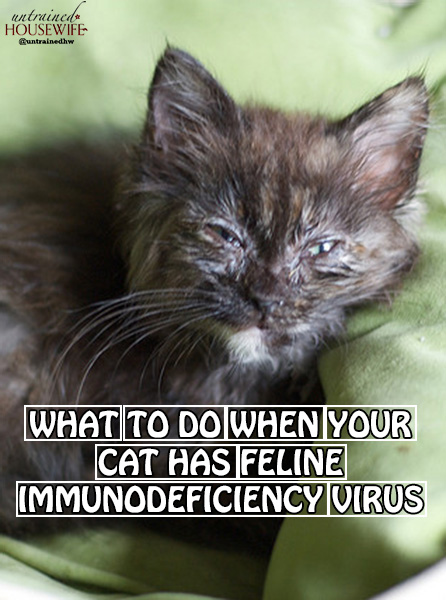
Feline Immunodeficiency Virus (FIV) in Cats.
Photo courtesy of Pete Markham
You’ve just taken your cat to the veterinarian and you’ve received the bad news: Your cat’s test for the feline immunodeficiency virus came back positive. Now what do you do? What does that mean to you and to your cat?
What is Feline Immunodeficiency Virus?
Feline immunodeficiency virus is also known as FIV or sometimes as feline AIDS. It is a virus that is passed from one cat to another, usually through wounds obtained while fighting.
The virus that causes FIV in cats is similar to the virus that causes AIDS or HIV in people. However, the viruses are species specific. People cannot gets AIDS, HIV or FIV from cats and cats cannot get AIDS, HIV or FIV from people.
What does a Positive FIV Test Mean for Your Cat?
A positive test for FIV means that your cat has been exposed to and has become infected with the feline immunodeficiency virus. However, if your cat is currently healthy and not showing signs of illness, a positive FIV test is far from being the death warrant that it was thought to be in the past. Many positive cats live for many months or even for many years.
A positive test for FIV does mean that your cat could pass the virus on to other cats. This is most often the case if your cat likes to fight with other cats. Fighting is the most common method of transmission for FIV. Rarely is the infection spread through more casual contact such as sharing food or water dishes, grooming one another or sleeping together.
What Symptoms Should You Look for in Your FIV Positive Cat?
The FIV virus is well-known for depressing the immune system of infected cats. What that means for your cat is that he will be more susceptible to secondary infections. These infections may be respiratory infections, gastrointestinal infections, bladder infections or any other type of infection. Any sign of illness in an FIV positive cat should be considered important and veterinary care should be sought immediately if your cat shows any signs of disease.
What Should You Do for Your FIV Positive Cat?
There are many precautions that you can take with your FIV positive cat to help him remain healthy.
- Keep your cat indoors. Allowing your cat to go outdoors endangers other cats in your community and it also exposes your cat to numerous infectious diseases that could be quite dangerous for him.
- Have your cat spayed or neutered.
- Keep your cat up-to-date on vaccinations. Remember the FIV virus can make your cat more susceptible to infection, so protecting cat against the most serious infections is important.
- Do not feed your cat raw meat or eggs. These products can carry bacteria such as Salmonella and E. coli, which may be dangerous for your FIV positive cat.
- Keep your cat free of both internal and external parasites. Parasites like fleas and ticks can carry diseases which can make your cat ill. Use affective flea and tick control methods. Parasites like heartworms and intestinal parasites should also be avoided and there are many safe products for controlling these pests.
- Have your cat examined by your veterinarian at least twice a year. Make sure your cat receives a thorough physical examination as well as periodic routine blood screens to monitor the progress of the disease.
- Take your cat to the veterinarian for treatment at the first sign of any type of illness.
Though there is no cure for infection with the feline immunodeficiency (FIV) virus, infected cats can live for long periods of time. Cats that have suffered serious illness related to FIV have a less optimistic prognosis. However, if your cat seems healthy, instituting some simple precautions can help prolong your cat’s lifespan, even in the face of FIV infection.




